"We want to work, we want to go out, we want to have a life. We want to be part of part of Ireland. But we're not. We're the invisible people. We're not seen. We're segregated. We're forgotten. We're the forgotten people of Ireland."
The words of Saoirse Smith, a 31-year-old comedian from Clontarf in Dublin who has cerebal palsy and uses a wheelchair.
She works full time and is a 'sit down' comedian, gigging in her spare time but many of the comedy nights are in old pub buildings, either in the cellar or upstairs with no lifts, forcing Saoirse to climb out of her wheelchair and use her hands and bum to negotiate the stairs.
"I have to go into buildings and crawl stairs and do all these things which I shouldn't have to do, but I do. and that's no fault of promoters, they're just renting a room. But there needs to be a renovation of these old buildings."
She goes on to specify that "Government needs to get on board and making buildings accessible, either old or new and there needs to be legislation." Inaccessible buildings stop artists with disabilities performing but also prevent audiences with disabilities enjoying it.
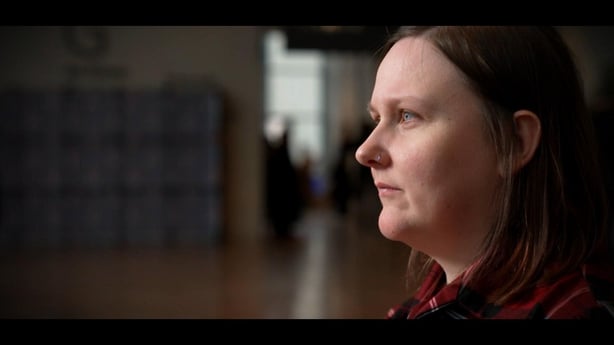
As if working full time and developing a comedy career isn’t enough, Saoirse is also a founder of an organisation called Disability Power Ireland which campaigns for equal rights for people with disabilities but Saoirse doesn’t let her disability get in her way.
Soairse’s boyfriend, Ciaran who is able bodied, helps her and gives her a hug of encouragement as she goes up the two flights of stairs for a comedy gig.
Once she is up and back in her wheelchair she gets ready for the gig and nervously watches the other acts before her turn. The audience laugh as she tells them "I am a ‘sit down’ comedian, I wanted to be a ‘stand up’ but here we are."
After her set, she and Ciaran have a well-deserved pint to celebrate. They often find it difficult to go out to places together as many restaurants, bars and even shops are not accessible and or don’t have disabled toilets.
Saoirse would like to move out of her parents house and live independently but like many young people, she worries she won’t be able to afford it. She is working full time and for the first five years of her job she will continue to receive some State supports based on her salary, but she fears losing her medical card, which pays for her medication, and other supports she uses living with cerebal palsy.
"The fear is losing my medical card and .. that’s the biggest fear for the majority of disabled people, it puts you off going to work because if you work you lose your benefits, you lose everything"
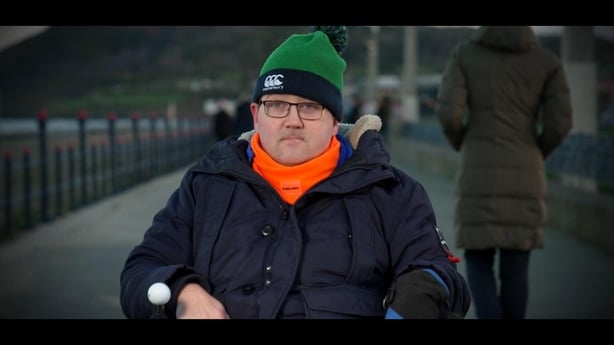
Padraic Moran, who is 39 and from Bray, Co Wicklow, knows all about this, when he started working in 2014, he lost all his State supports immediately.
"Because you work in Ireland and pay tax, in the eyes of the country you are cured. When you want to be a better person, you want to contribute to society, it is like oh no well then you don’t need any of this."
In 2018, he spoke at a special sitting of the Oireachtas on access and support services for people with disabilities as they move from education to employment and - alongside others - convinced politicians that people in employment needed continued support.
Within months the law was changed so those starting in employment would be assessed for disabilitiy allowance with reduced rates, their medical card could continue for three years and the travel pass for five years.
"People with impairments are not a big voting group so not a threat to any of the main Government parties"
While this new arrangement helps people with disabilities, it creates a situation where people with disabilities take on a job for three years and then leave to protect their benefits.
"They introduced a transition period of three years so you get to keep to all your entitlements and benefits and then you are cured. So what happens is that somebody goes to work for three years, they will have to leave their job, go back in the system and then find another job because it is not worth it for them to come off the support systems like social welfare.
"Essentially, what you are doing is putting people into a poverty trap because it is very hard to survive on any basic rate but with a disability."
While Padraic attempts to advocate for people with disabilities, he feels that legislation and attitudes are difficult to change in Government due to the fact that "people with impairments are not a big voting group so not a threat to any of the main Government parties because we can’t go out on mass to protest for things to change."
He uses his profile as a former Paralympian in Boccia to campaign for change and to be a positive force for people with disabilities and is hoping to qualify for the Paris Paralympics next year.
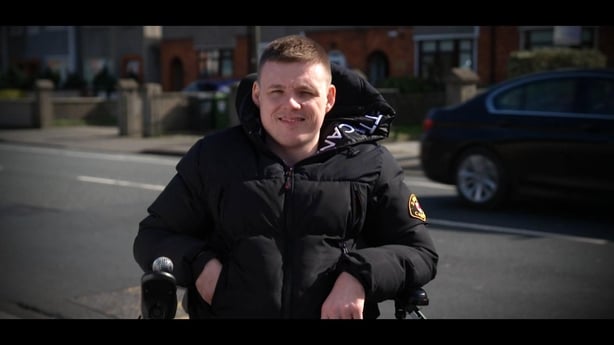
His team mate Dylan Nelson, is 29 years old and is also competing in international Boccia qualification events with the hope to get to Paris next year. Dylan works full time and commutes everyday on the bus.
He is ambitious and wants to climb the career ladder but worries that the unpredictability of his life will put his job at risk. He was issued with a new power wheelchair in 2020 which had only half the distance range compared to his previous one.
He often has to choose between working or doing sports or socialising: "So during work, just going out to get lunch with the only bits and pieces around the office, that’s half my range gone. And then I drive up and back to a bus stop and get a bus and go home…. So when I get home, I'm in for the evening, which means I don't have a social life, I can't go out with friends"
He also thinks that because this wheelchair has lower power than his last one, it breaks down more often.
"As someone who wants to live an independent life, having to ring your manager and go, I can't come in today because effectively my legs have decided not to work - which is what my chair is, it's my legs. It's how I get around."
He believes he is disadvantaged because his life is limited to 7km a day.
"It's quite soul destroying because I worked for five years to get a job in the civil service, and now I'm struggling to keep that job because of my wheelchair breaking down. They changed the range of the chair without discussing with me before they put the funding through. It wasn't discussed. I now have a chair that's no use to me. "
Dylan is learning to drive a car as public transport is unreliable. Often he will be left waiting as a bus comes and goes because either there are two children’s buggies in the wheelchair spaces and the bus driver will not ask them to vacate or the ramp is broken and he cannot get onto the bus.
"If I can't go on a bus because of a buggy in the wheelchair bay, that individual can take that buggy, fold it and put it to one side, whereas I can't fold this wheelchair... And what do I do? It's not just, 'oh he is delayed for 20 minutes'. We're in Ireland, so we are not sitting out in the sunshine. Could be raining, could be very cold, could be everything."
Dylan lives with his mother, father and brother in Drimnagh, south Dublin. His small bedroom is in an extension that was built for him when he was a child.
"That room was built when I was eight, so there's been no refiguring for my chair getting bigger, for me, needing more equipment, and there's just no room for more equipment."
He is on the emergency housing list for a council home but it is a long wait and until then he is frustrated at not being able to live his life to the full.
"I want all the things you can have in a normal life. A girlfriend, wife, a house. But at the moment, I can't seem actually happening because of the way the Government have set up the plan for people with disabilities."
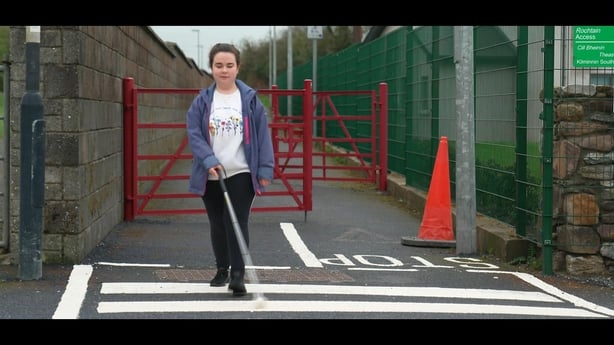
Niamh Kilcawley, who is 16 years old and lives in Dungarvan, Co Waterford, also feels that the Government does not do enough for people with disabilities.
She went blind as a result of a brain tumour when she was nine years old. Suddenly plunged into darkness, she is struggling to learn Braille and to use other aids for those who are blind, alongside keeping up with all her other school work.
Last year in her Junior Certificate exams she was given a ‘scribe’ - this is a person who reads and writes her answers as dictated by Niamh. She only has the same extra ten minutes per hour given to anyone with a disability to complete these tests.
"But it's not enough time because I have to tell them what to write down. Then I have to get them to explain the question. I have to be able to picture that question in my head and what to write down. And then once they've written it, I have to go on to the next question. Think about that and those ten minutes are completely gone.
"I would love if there was an individual assessment on how much somebody might need, because everybody's needs are going to be different."
Despite her difficulties, she managed to to get the best results in her school. "The system isn't designed for me. I have to learn around it. So for me to be able to achieve as well or even better as anyone, I need to put in ten times hard work than they do."
"I'm not going to let my disability deter from the fact that what I want to do in life and what I like to do for fun."
Now in transition year, she is hoping the system might change before she does her Leaving Certificate.
"That is quite daunting because I only get ten minutes in English and History, full stop. Which I don't know how that makes me feel? It makes me feel very nervous and I don't know how that will work because that is incredibly not absolutely not enough time? And it's quite stressful."
As a latecomer to Braille and other tools for the blind she feels she will be at a disadvantage.
"I don't feel like it's a level playing field for myself and everyone and it's not fair. And I want the same opportunity as everybody else."
Last summer she and her mother went to the Dáil Éireann. "We have met with ministers, we have informed them about the situation. We haven't been aware of much change since then, which is unfortunate. I would love if progress happened as soon as possible because that needs to be changed for everyone, not just me," she said.
Niamh is determined to get to university and not to let her disability get in the way.
"College? We'll see how it goes. I think it will be a different experience for myself, going into a whole new world, me being independent, but I'm building my skills up to it. I'm becoming more independent as I get older and going out more with my friends and doing more social things. And shopping, because I love shopping.
"I'm not going to let my disability deter from the fact that what I want to do in life and what I like to do for fun."
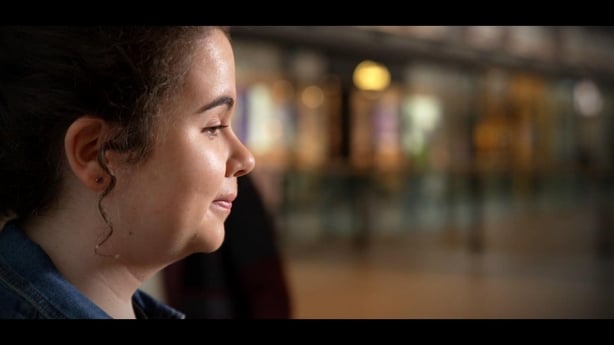
The only challenge she finds when out and about is other people not being aware of her disability.
"I have my cane. That is a visual way for people to know that I'm blind. Some people don't know what my cane is. Some people aren't educated about it, and I think that's something important that needs to be introduced into schools, rather than somebody staring at me with their mouth open. Because unfortunately, it does happen a lot.
"People walk in my way. They ignore the fact that I have a cane. And it's not only rude, but it's dangerous for myself and for them, because I'm going to walk into you, that’s not my fault."
Niamh wore a body camera whilst walking around Blachardstown Shopping Centre to demonstrate for Prime Time and several distracted people nearly collide with her.
All four people who took us into their lives for this Prime Time film are incredibly positive people, giving their all into making Ireland a better place and yet they all feel they are treated as second class citizens.
"Everybody who’s at home, I would just tell them that I want an equal chance in life and the same opportunities as everybody else... I need everybody to support me in being able to do that … and just to be kind and be more aware of my situation and other people’s situations", says Niamh.
"Don’t think a disabled person can’t do something, a disabled person can do anything they put their mind to so when you see a disabled person, offer help, have a conversation, don’t be afraid to talk to them," says Dylan.
Padraic hopes that Ireland will get behind them.
"With the gay marriage referendum, Ireland galvanised to get something to change and it changed and rightly so, but unless something happens for people with disabilities … it is always going to be this battle, it is never going to change."
Saoirse hopes that Disability Power Ireland will "raise awareness that we are just like everybody else and to show the world that we are just like you".
"We want to continue just being in society and to have a disability pride parade to celebrate different abilities because, why not? We celebrate everything else. Why not celebrate this?
"Being disabled isn’t a bad thing you know, I wouldn’t wish it upon anyone but I find that it is my environment that disables me more that my actual disability itself."
